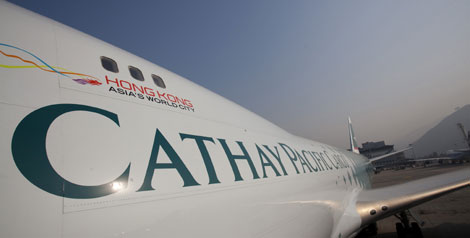EU law to impose carbon cost on all airlines
Updated: 2011-12-23 08:07
(China Daily)
|
|||||||||
|
|
LUXEMBOURG / BRUSSELS, - Europe's highest court gave unreserved backing on Wednesday to a European Union (EU) law to charge airlines for carbon emissions on flights to and from Europe, a decision likely to escalate tension with trading partners, especially the United States.
The court ruled against a group of US airlines that had challenged a law requiring that all airlines flying to and from airports in the European Union will have to buy permits under the EU's emissions trading scheme from Jan 1. The initial cost is expected to be minimal but would rise to an estimated 9 billion euros ($11.8 billion) by the end of 2020.
"Application of the emissions trading scheme to aviation infringes neither the principles of customary international law at issue, nor the open-skies agreement," the European Court of Justice (ECJ) said.
EU Climate Commissioner Connie Hedegaard, for whom the carbon-trading scheme is one of the main weapons to combat climate change, was among the first to welcome the decision.
"After a crystal-clear ruling today, the EU now expects US airlines to respect EU law as the EU respects US law," she said in a Twitter posting.
The US government, which has warned it could take "appropriate action" if the EU did not reconsider this aspect of the Emissions Trading Scheme (ETS), said it was dismayed by the ruling, and reiterated that it wanted the issue addressed by the International Civil Aviation Organization (ICAO).
"We continue to have strong legal and policy objections to the inclusion of flights by non-EU air carriers in the EU ETS," Krishna R. Urs, deputy assistant secretary for transportation affairs at the US State Department, said in statement.
Airline associations reacted swiftly. The US airline industry body Airlines for America said it was reviewing its legal options, but meanwhile would "comply under protest".
Global solution
Lawyers and some environmentalists said the next logical step would be for the ICAO to come up with a global solution soon. "The EU's leadership is really significant. This is a first step. What we need now is a broad-based system from ICAO," Pamela Campos, an attorney at US lobby group the Environmental Defense Fund, said.
The ruling by the ECJ, Europe's highest court, is final, although there is some flexibility in how the regulation may be applied.
The EU law allows for "equivalent measures", meaning that incoming flights to Europe would be exempt if the nation from whence they came had measures in place to offset the international emissions.
Airlines initially would be required to pay for only 15 percent of the carbon they emit and would be allocated free allowances to cover the other 85 percent. From 2013 to 2020, airlines will be expected to buy around 700 million permits, according to Thomson Reuters Point Carbon data.
"We expect the aviation sector's burden in the EU's emissions trading scheme for 2012 to be close to 500 million euros, based on our current price forecasts for 2012," Andreas Arvanitakis, associate director, Thomson Reuters Point Carbon, said in a statement.
"The sector will face a shortfall of around 60 million tons (of carbon). The cost rises to 9 billion euros total by the end of 2020." The EU carbon market pared losses immediately after the ruling but stayed negative. Analysts said the decision had been widely anticipated but could provide support for in the long term as airlines stock up on permits.
Already, the EU sets a cap on the level of emissions allowed from factories and power plants. Emitters exceeding their quotas must buy carbon permits, while those within their limits can sell any unused allowances.
Emissions from most other sectors have fallen, but those from airlines have doubled since 1990 and could triple by 2020, figures show.
"This decision represents a green light toward an emerging patchwork of complex, bureaucratic and punitive regional schemes, which will ultimately have no impact on improving the environment and will hit passengers," Carolyn Leung, a spokeswoman for Cathay Pacific Airways Ltd, said.
Singapore Airlines Ltd said the EU was being unfair. "It could also cripple competitiveness as it offers carriers operating through hubs closer to Europe an unfair advantage," spokesman Nicholas Ionides said.
Qantas Airways Ltd said the "patchwork approach" was flawed, but its policy was to comply with carbon law wherever it operated. A spokesman said the company was still finalizing policy, but anticipated costs would be passed on to passengers.
Meanwhile, customers are bracing for yet another line item to appear on their ticket charges.
"The airlines quite honestly just have to pass it on," said Jeff Kauffman, an analyst with Sterne Agee & Leach. "Anybody going to Europe is going to have to pay a higher fare."
Reuters












